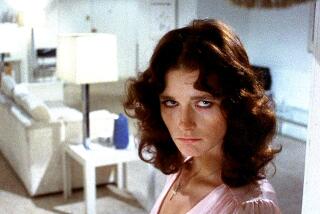The deep meaning of ‘Ferris Bueller’ and ‘Sixteen Candles’
“BABY’S Day Out,” “Mr. Mom” and “Curly Sue” are all films written and/or directed by John Hughes. But make no mistake: They are not the films of John Hughes. Not by the standards of those who came of age amid the rise of the high-fashion leg warmer.
To survivors of the era, the John Hughes movies that matter -- right down to the once-Clearasil-coated core -- are “Sixteen Candles,” “The Breakfast Club,” “Pretty in Pink,” “Ferris Bueller’s Day Off,” “Some Kind of Wonderful,” “Weird Science” and sometimes “She’s Having a Baby.” But definitely not “Dutch” or, sorry, not the “Home Alone” franchise. Getting the VHS picture? The films of John Hughes were released from 1984 to 1988. They were set to tunes fit for classic KROQ. And they were unabashedly devoted to teenagers (which is why “She’s Having a Baby” doesn’t fit), their ouch-that-really-hurts angst (which is why “She’s Having a Baby” does fit) and their suburban Chicago oppressors (i.e. parents, teachers, James Spader).
The genius of quintessential Hughes is that the movies are impossible not to take personally. You love them. Or you hate them. You see yourself. Or you see absolutely nobody like yourself. You empathize with Molly Ringwald’s perceived invisibility in “Sixteen Candles.” Or you wish Molly Ringwald’s Everyteen (who is definitely not you) would go back to the upper-middle-class neighborhood from whence she came, count her blessings, if not her father’s stock earnings, and shut up.
In short, the films of John Hughes are benchmarks, ways of judging who we were or weren’t. They are us, like it or not.
For the most part, the writers whose Hughes-examining essays comprise “Don’t You Forget About Me” -- the title is borrowed from the “Breakfast Club” Simple Minds anthem -- are like them too. Sure, they recognize the flaws -- the potato sack of a prom dress we’re supposed to believe is couture in “Pretty in Pink”; the false-feeling ending from the same film in which the wrong-side-of-the-tracks seamstress (Ringwald) ends up with the rich-side-of-the-tracks preppy (Andrew McCarthy) instead of the ardent Duckie, who ends up with the tacked-on Duckette; and the cheap, Long Duk Dong gags from “Sixteen Candles.” (The name was culturally insensitive enough -- was it necessary to bang a gong too?) But mostly the writers recognize the films as pieces of their lives.
Novelist Lisa Borders (“Cloud Cuckoo Land”) sees Ringwald’s “Sixteen Candles” fairy-tale ending in a special night at the South Jersey shore with her very own Jake Ryan. Emily Franklin (“The Girls’ Almanac”) sees Eric Stoltz’s third-reel discovery of Mary Stuart Masterson in “Some Kind of Wonderful” in her own fumbled attempts to turn friends into lovers. Poet Rebecca Wolff sees Matthew Broderick’s blithe Ferris Bueller in her youth -- unfettered and untroubled, until the really bad acid trip, anyway.
Even the writers who don’t identify with Hughes’ versions of adolescence still fess up to going along for the school-bus ride. The North Side privileges enjoyed by Ferris and friends are not lost on South Side Chicago’s John McNally (“America’s Report Card”). Yet instead of resentment, McNally remembers feeling admiration for Ferris -- not so much for the Ferrari 250 California Spyder the ever-clever character “borrows” but for the security that is his birthright. (Only on a more recent viewing of the 1986 comedy does McNally feel disdain for Ferris’ ditch day and disgust at the script’s shoddy treatment of minorities and even Principal Rooney, a man who, when you think about it, was just trying to do his job.)
Moon Unit Zappa, the rock-star offspring, Valley Girl channeler and author (“America the Beautiful”), thrills to Hughes movies as if they were science-fiction tales. Who, she wonders, are these creatures with fathers who wear ties? Whose families gather nightly and peaceably ‘round dining-room tables? Who get noticed, and pursued, by Michael Schoeffling?
Like the films of John Hughes, the essays of “Don’t You Forget About Me” are easily devoured -- and pretty white. What was it like to be a black kid faced with the multiplex option of Molly Ringwald, Molly Ringwald or Molly Ringwald? No idea.
The main point, and triumph, of “Don’t You Forget About Me” is that at the end of the long, tortuous school day, “Sixteen Candles” meant something.
No offense, “Curly Sue.”
Joal Ryan is the author of “Former Child Stars: The Story of America’s Least Wanted” and “Katharine Hepburn: A Stylish Life.”
More to Read
Only good movies
Get the Indie Focus newsletter, Mark Olsen's weekly guide to the world of cinema.
You may occasionally receive promotional content from the Los Angeles Times.










